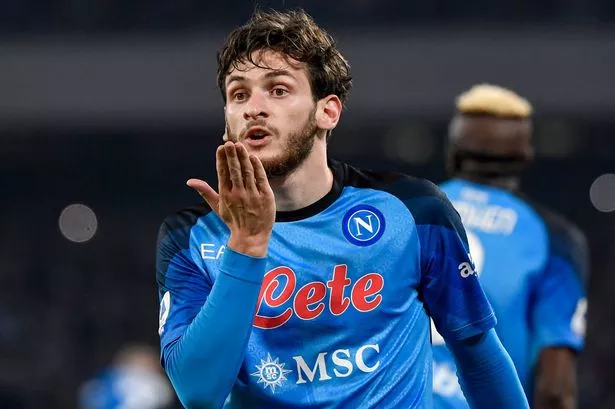
Biography of Khvicha Kvaratskhelia — The Path of the Georgian Footballer to Success
The remarkable journey of Khvicha Kvaratskhelia from the streets of Tbilisi to becoming one of Europe’s most coveted football talents represents more than just sporting achievement—it embodies the dreams and aspirations of an entire nation. Born into a modest Georgian family with unwavering belief in hard work and dedication, Kvaratskhelia’s story illustrates how raw talent, combined with relentless determination and proper guidance, can transcend geographical and economic barriers to reach the pinnacle of international football success.
Early Years and Childhood
Place and date of birth of Khvicha Kvaratskhelia
Khvicha Kvaratskhelia entered the world on February 12, 2001, in Tbilisi, the vibrant capital city of Georgia. His birth occurred during a pivotal period in Georgian history, as the country was still navigating its post-Soviet independence and establishing its unique national identity. The timing of his arrival proved fortuitous, as Georgia’s football infrastructure was beginning to modernize, creating opportunities that previous generations of talented players had never experienced.
Tbilisi, with its rich cultural heritage and passionate sporting traditions, provided the perfect backdrop for nurturing a future football star. The city’s numerous parks, courtyards, and improvised football pitches became the early training grounds where young Khvicha would spend countless hours honing his skills. The urban environment of Georgia’s largest city exposed him to diverse football influences and competitive opportunities that might not have been available in smaller towns or rural areas.
The significance of his Georgian birth cannot be understated, as it connected him to a football culture that values technical skill, creativity, and individual flair. Georgian football philosophy emphasizes the importance of ball control, dribbling, and artistic expression on the field—qualities that would later become hallmarks of Kvaratskhelia’s playing style. Growing up in this environment provided him with a natural understanding of football as both sport and art form.
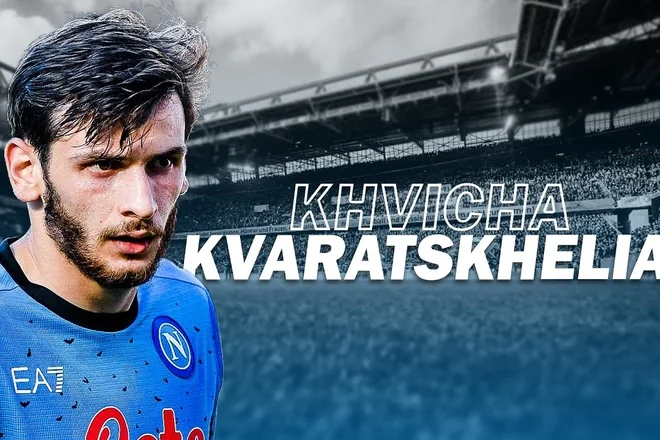
Family and childhood: influence on personality development
The Kvaratskhelia family played an instrumental role in shaping the character and values that would guide Khvicha throughout his career. His parents, while not professional athletes themselves, understood the importance of supporting their son’s passion and were willing to make significant sacrifices to ensure he received proper training and opportunities. Their working-class background instilled in him humility, respect for hard work, and appreciation for the value of persistence in achieving goals.
Family gatherings often revolved around football discussions, with relatives sharing stories of legendary Georgian players and international football heroes. These conversations sparked young Khvicha’s imagination and helped him understand that football could be a pathway to representing his country and achieving personal success. The strong family support system provided emotional stability during the inevitable challenges and setbacks that accompany any athlete’s development journey.
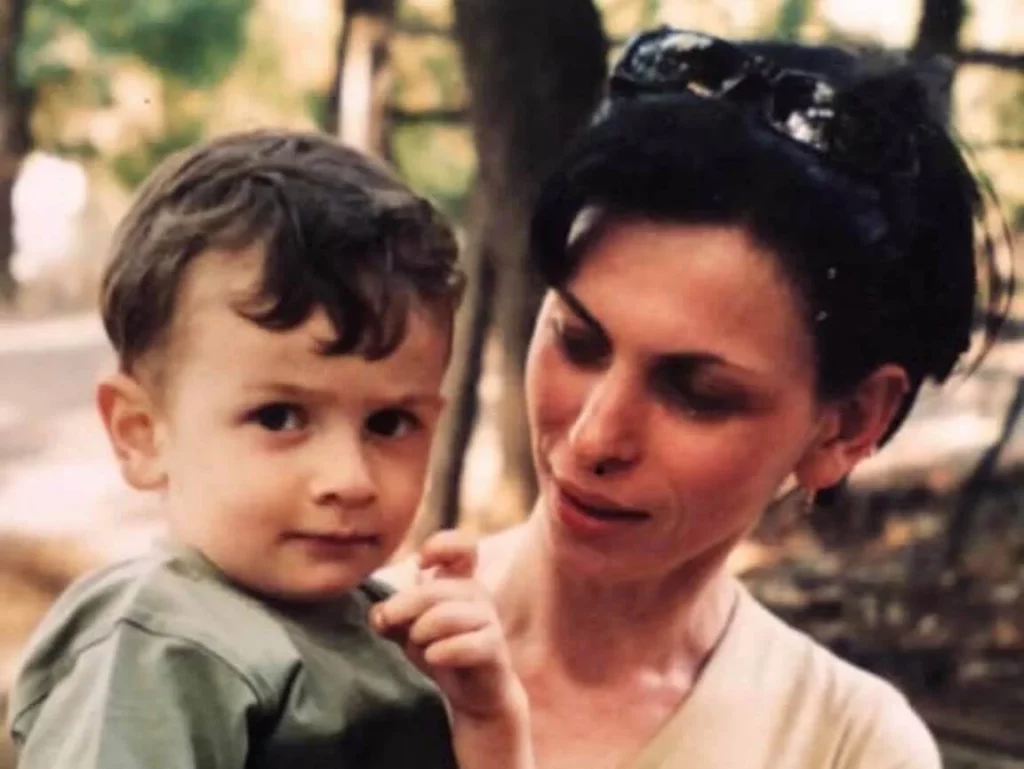
His parents’ emphasis on education alongside football development created a balanced foundation for his growth. They insisted that academic responsibilities remain a priority even as his football talents became increasingly apparent. This balanced approach contributed to his mental resilience and ability to handle pressure, as he learned to manage multiple commitments and maintain focus across different areas of his life.
The influence of extended family members, including uncles and cousins who had played football at various levels, provided additional mentorship and guidance. These relationships exposed him to different perspectives on the game and helped him understand the dedication required to succeed in professional football. Family stories of both triumph and disappointment in sports taught him valuable lessons about perseverance and maintaining perspective during both success and failure.
First contact with football and initial training
Kvaratskhelia’s introduction to organized football began at the remarkably young age of six, when his natural ball-handling abilities caught the attention of local coaches during informal neighborhood games. His innate coordination and fearless approach to taking on older children immediately distinguished him from his peers. These early displays of talent convinced his parents that formal training would be beneficial for developing his obvious gifts.
His first structured football experiences occurred at a local youth sports center, where he participated in basic skill development sessions alongside other aspiring young players. The transition from street football to organized training required adjustments in discipline and following instructions, but his natural enthusiasm for the game made these adaptations relatively seamless. Coaches quickly recognized his exceptional potential and recommended advancement to more specialized training programs.
The early training regimen focused on fundamental techniques such as passing, dribbling, and ball control, areas where Kvaratskhelia demonstrated remarkable aptitude. His left foot showed exceptional precision and power from an early age, leading coaches to develop specific exercises designed to maximize this natural advantage. The combination of natural talent and structured training began to produce noticeable improvements in his overall game awareness and technical abilities.
Practice sessions became the highlight of young Khvicha’s daily routine, with his excitement and preparation for training impressing coaches and fellow players alike. His willingness to stay after official sessions ended to continue practicing demonstrated the passion and dedication that would characterize his entire career. These early experiences established patterns of professional behavior and commitment that would serve him well as competition levels increased.
Youth and Junior Career
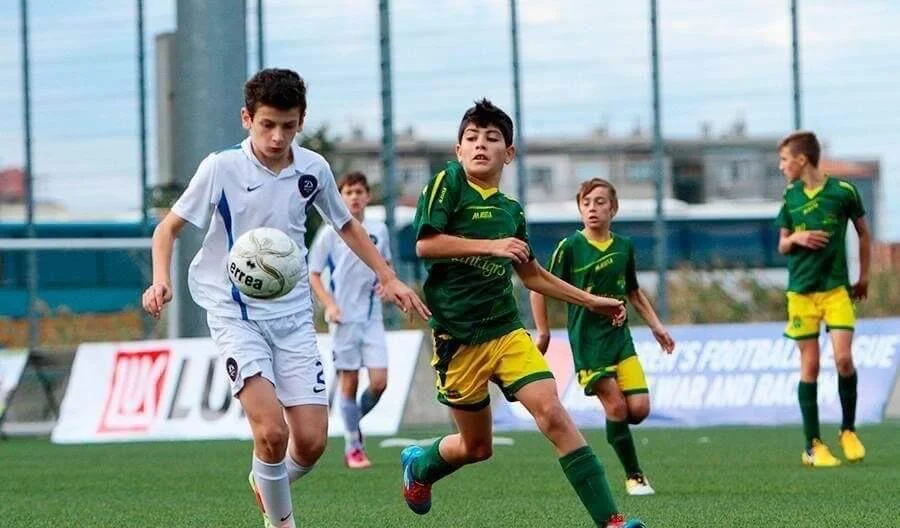
Football academies and schools
The progression to more advanced football education came through his acceptance into the prestigious Dinamo Tbilisi youth academy, one of Georgia’s most respected football development institutions. This transition represented a significant step forward in his football education, providing access to professional-level coaching, better facilities, and competition against the country’s most promising young talents. The academy environment demanded higher levels of commitment and performance than his previous training experiences.
At Dinamo Tbilisi’s academy, Kvaratskhelia encountered systematic football education that addressed all aspects of player development, from technical skills and tactical understanding to physical conditioning and mental preparation. The curriculum included classroom sessions on football theory, video analysis of professional matches, and structured fitness programs designed to optimize athletic development. This comprehensive approach accelerated his understanding of football’s complexities beyond basic skill execution.
The academy’s coaching philosophy emphasized creativity and individual expression while maintaining tactical discipline and team cohesion. This balanced approach perfectly suited Kvaratskhelia’s natural playing style, allowing him to develop his flair for improvisation while learning the importance of playing within team structures. The exposure to different coaching methods and tactical systems broadened his football intelligence and adaptability.
Competition within the academy environment pushed Kvaratskhelia to consistently elevate his performance levels. Training alongside other highly talented players created a competitive atmosphere that demanded continuous improvement and adaptation. This internal competition prepared him for the challenges he would later face in professional football, where complacency could quickly result in loss of playing opportunities.
Early successes and competitions in youth teams
Kvaratskhelia’s talent quickly manifested in competitive results, with his goal-scoring and playmaking contributions helping his youth teams achieve significant success in regional and national competitions. His ability to influence match outcomes through individual brilliance became a consistent theme throughout his junior career. These early successes provided confidence and validation that his dedication to football development was producing tangible results.
Participation in national youth tournaments exposed him to different playing styles and tactical approaches from across Georgia and neighboring countries. These experiences broadened his tactical understanding and demonstrated the variety of ways football could be played effectively. The exposure to diverse competition helped him develop adaptability and problem-solving skills that would prove valuable throughout his career.
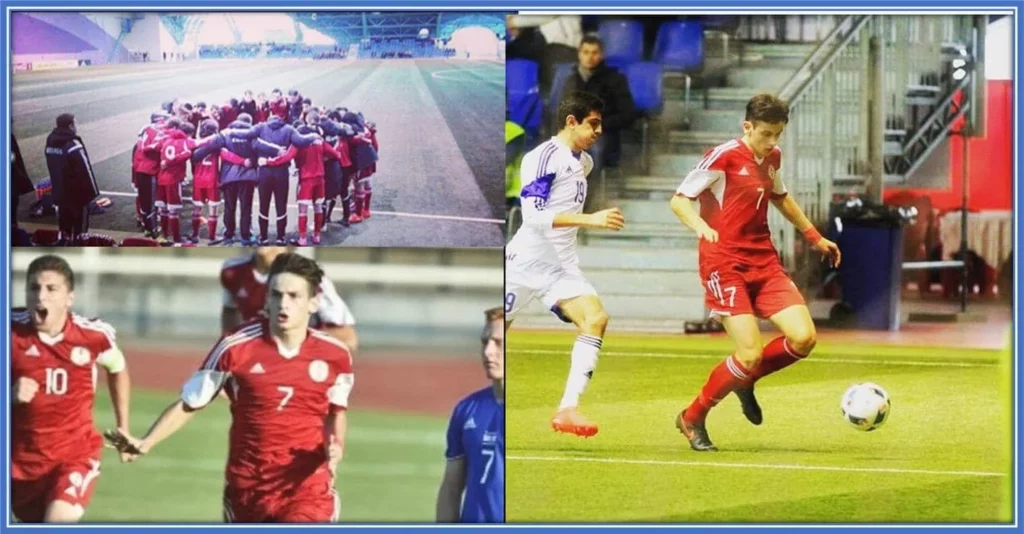
International youth tournaments provided his first taste of representing Georgia on a larger stage, an experience that deepened his connection to national pride and responsibility. His performances in these competitions often stood out, earning recognition from scouts and coaches from other countries. These international experiences also exposed him to higher levels of organization and professionalism in football operations.
Individual awards and recognition during his youth career included selection for regional all-star teams and identification as one of Georgia’s most promising young players. These honors brought increased attention and expectations but also provided motivation to continue improving and developing his abilities. The recognition served as validation of his potential while emphasizing the need for continued hard work and development.
Important coaches and mentors in player development
Throughout his youth development, several key coaching figures played crucial roles in shaping Kvaratskhelia’s football education and personal growth. His first professional coach at Dinamo Tbilisi recognized his exceptional dribbling ability and worked specifically on developing his decision-making in one-on-one situations. This coach’s emphasis on maintaining creativity while improving efficiency helped establish the foundation for his distinctive playing style.
A particularly influential mentor focused on developing his left foot as a primary weapon, designing specific training exercises to maximize the power, accuracy, and versatility of his preferred foot. This specialized attention helped transform a natural advantage into a devastating attacking tool that would later terrorize professional defenders. The technical refinement achieved through this focused training became a defining characteristic of his playing ability.
Physical conditioning coaches played essential roles in preparing his body for the demands of higher-level competition. Their programs focused on developing the explosive speed and agility that would become crucial elements of his playing style. The early emphasis on proper physical development helped prevent injuries and provided the athletic foundation necessary for competing against older and stronger opponents.
Mental preparation and psychological coaching became increasingly important as competition levels intensified and pressure increased. Mentors helped him develop strategies for handling stress, maintaining confidence during difficult periods, and staying focused on long-term goals despite short-term setbacks. These psychological tools proved invaluable for navigating the emotional challenges that accompany competitive football at any level.
Transition to Professional Football
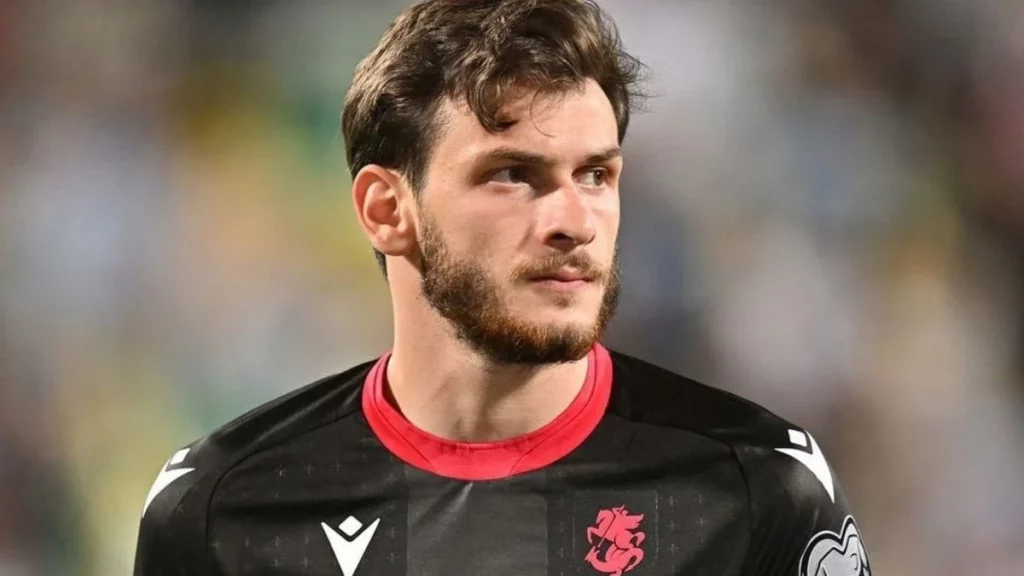
Debut in professional Georgian clubs
The transition from youth football to professional status represented a pivotal moment in Kvaratskhelia’s development, marking his official entry into the adult world of competitive football. His debut for Dinamo Tbilisi’s senior team came at age seventeen, making him one of the youngest players ever to represent the club at professional level. The step up in competition quality, physical demands, and tactical complexity required significant adjustments in his approach to training and match preparation.
Initial professional appearances were carefully managed by coaching staff who understood the importance of gradual integration rather than overwhelming a young player with excessive responsibility. Limited playing time in early matches allowed him to acclimate to professional football’s pace and intensity while building confidence through positive experiences. His natural talent was immediately apparent, but the learning curve for adapting to senior football’s mental and physical demands required patience and persistence.
The impact of his professional debut extended beyond personal achievement to inspire other young Georgian players who saw that domestic talent could successfully make the transition to senior football. His success provided a template for other aspiring professionals and demonstrated that Georgia’s youth development systems could produce players capable of competing at higher levels. This inspirational effect contributed to increased interest and investment in youth football throughout the country.
Early professional experiences taught valuable lessons about consistency, professionalism, and the mental resilience required for success at higher levels. The transition from being a standout youth player to competing against experienced professionals required adjustments in confidence and approach. These early challenges provided essential learning experiences that prepared him for even greater challenges ahead.
First contracts and professional level trials
Negotiating his first professional contract marked a significant milestone in Kvaratskhelia’s career, representing formal recognition of his potential and value as a professional athlete. The contract terms reflected his status as a promising young player while providing financial security and professional development opportunities. Understanding the business aspects of professional football became an important part of his education during this period.
The experience of contract negotiations introduced him to the commercial realities of professional football, including agent representation, performance clauses, and future transfer considerations. These business aspects required learning new skills beyond football ability, including understanding legal terminology and making strategic career decisions. The guidance of experienced advisors became crucial for navigating these complex professional relationships.
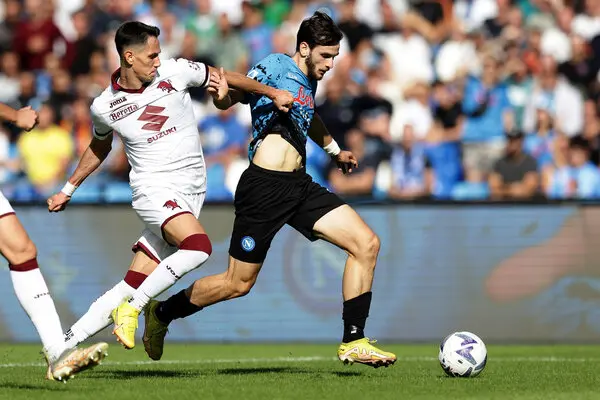
Trial periods with other clubs provided opportunities to showcase his abilities in different environments and tactical systems. These experiences broadened his understanding of football’s diversity and helped him develop adaptability skills that would prove valuable throughout his career. The exposure to different coaching methods and team cultures enhanced his football education beyond what any single club could provide.
Performance in trial situations demonstrated his ability to quickly adapt to new environments and make positive impressions in limited time frames. This adaptability suggested strong mental resilience and confidence in his abilities, qualities that would prove essential for later career moves to foreign leagues and clubs. The success in various trial situations provided validation of his readiness for higher-level opportunities.
First major achievements and attention from foreign clubs
Early professional achievements included helping Dinamo Tbilisi achieve success in domestic competitions and establishing himself as one of Georgian football’s most exciting young talents. His contributions to team success through goals, assists, and overall play attracted attention from football media and scouts representing foreign clubs. These achievements provided concrete evidence of his ability to influence results at professional level.
Recognition as Georgian football’s rising star brought increased media attention and public expectations, requiring development of skills for handling publicity and maintaining focus on football development. The balance between embracing recognition and avoiding distraction became an important aspect of his professional growth. Learning to manage external pressures while maintaining internal motivation proved crucial for continued development.
Interest from foreign clubs represented validation of his potential for success beyond Georgian football, opening possibilities for career advancement and higher levels of competition. Initial contact from international scouts provided glimpses of potential opportunities while emphasizing the need for continued improvement and consistency. These early expressions of interest motivated further development and provided goals for future career progression.
The attention from abroad also highlighted the growing profile of Georgian football and the success of domestic development systems in producing exportable talent. His success contributed to increased scouting attention on other Georgian players and raised the overall profile of the domestic league. This broader impact demonstrated how individual success could benefit the entire Georgian football ecosystem.
Personal Development and Character
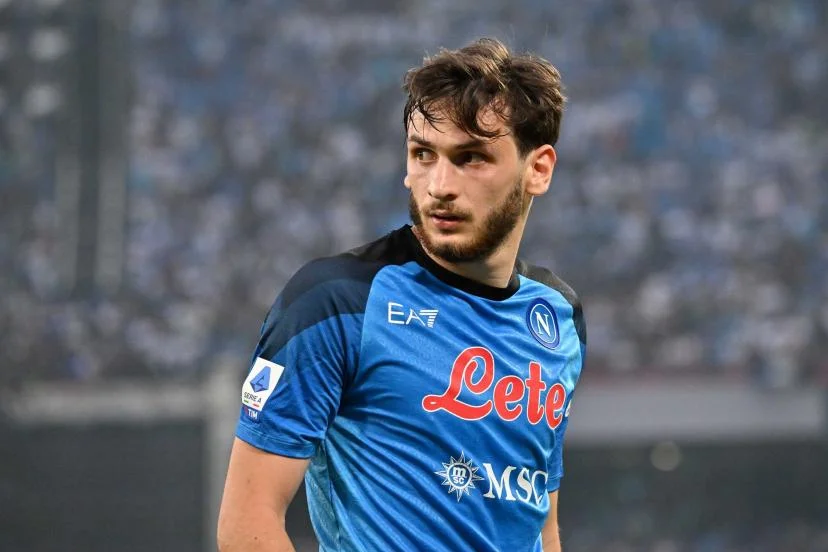
Character traits that helped achieve success
Humility has remained a constant throughout Kvaratskhelia’s rise to prominence, preventing success from negatively affecting his personality or work ethic. Despite achieving recognition and financial success at a young age, he has maintained respect for teammates, coaches, and opponents while continuing to approach each training session and match with genuine enthusiasm. This humility has earned respect from football professionals and contributed to positive team dynamics wherever he has played.
Resilience in the face of setbacks has been a defining characteristic of his personality, enabling him to bounce back from disappointing performances, injuries, or career obstacles. His ability to learn from negative experiences rather than allowing them to undermine confidence has been crucial for maintaining upward career trajectory. This mental strength has been particularly valuable during adaptation periods when moving to new clubs or higher levels of competition.
Natural leadership qualities have emerged as he has gained experience and confidence, with teammates and coaches recognizing his ability to inspire others through both words and actions. His willingness to take responsibility in crucial moments and encourage struggling teammates has made him a valuable presence in team environments. These leadership characteristics have been particularly evident in his performances for the Georgian national team.
Intellectual curiosity about football tactics, opponent analysis, and continuous improvement has distinguished him from players who rely solely on natural talent. His interest in understanding the theoretical aspects of football and studying successful players from different eras has contributed to his tactical intelligence and adaptability. This cerebral approach to football development has accelerated his learning curve and enhanced his value to coaches.
Attitude towards training and professional ethics
Professional dedication to training has been a hallmark of Kvaratskhelia’s approach throughout his career, with coaches consistently praising his preparation, punctuality, and intensity during practice sessions. His understanding that natural talent must be supported by consistent hard work has driven him to maintain high training standards regardless of his success level. This work ethic has set positive examples for teammates and earned respect from coaching staff.
Attention to physical conditioning and injury prevention has reflected his long-term thinking about career sustainability and peak performance maintenance. His commitment to proper nutrition, recovery protocols, and fitness maintenance demonstrates understanding that professional football careers require comprehensive lifestyle management. This holistic approach to professional preparation has contributed to his consistent availability and performance levels.

Coachability and openness to instruction have remained consistent despite his growing reputation and success, allowing him to continue learning and adapting throughout his career progression. His willingness to accept criticism and implement coaching suggestions has facilitated smooth transitions to new tactical systems and team environments. This receptiveness to guidance has accelerated his development and made him valuable to coaches at all levels.
Respect for teammates, opponents, and football traditions has characterized his professional behavior both on and off the field. His understanding that football success depends on collective effort rather than individual brilliance has made him a positive influence in team environments. This respectful approach has contributed to strong relationships with colleagues and enhanced his reputation within football communities.
Stories of overcoming difficulties and motivation
Early career setbacks included periods of limited playing time and adaptation challenges when moving between different competitive levels. His response to these frustrating experiences demonstrated character strength and determination to improve rather than become discouraged. The lessons learned during difficult periods proved valuable for developing mental resilience and maintaining perspective during both success and failure.
Injury recovery experiences tested his patience and commitment to proper rehabilitation protocols, requiring different types of mental strength than competitive performance demands. His disciplined approach to recovery and gradual return to full fitness demonstrated maturity and long-term thinking about career management. These experiences also deepened his appreciation for physical health and the temporary nature of athletic ability.
Family financial pressures during his youth required balancing football development with understanding of economic realities and family responsibilities. His motivation to succeed included desires to improve his family’s circumstances and provide security for loved ones. This additional motivation source provided extra determination during challenging periods and helped maintain focus on long-term goals.
Cultural adaptation challenges when moving to foreign football environments required developing new communication skills and adjusting to different social and professional expectations. His success in overcoming language barriers and cultural differences demonstrated adaptability and determination to succeed regardless of environmental challenges. These experiences broadened his perspective and enhanced his ability to thrive in diverse circumstances.
Interesting Facts about Khvicha Kvaratskhelia’s Life
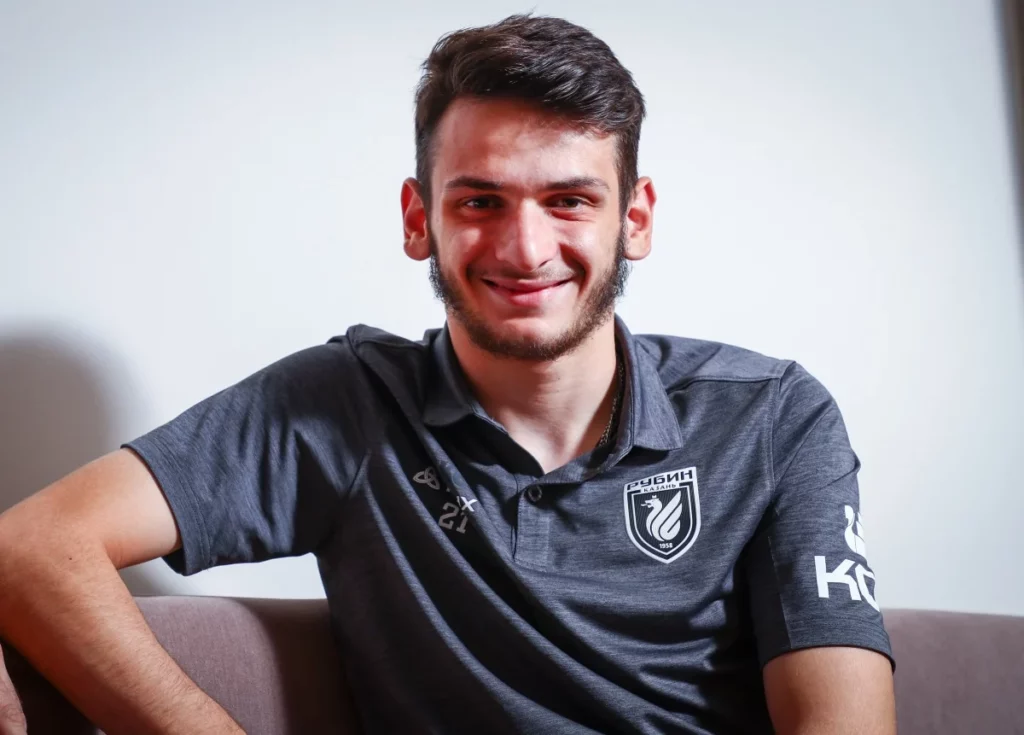
Hobbies outside football
Music appreciation represents one of Kvaratskhelia’s primary interests outside football, with his preferences reflecting both international contemporary styles and traditional Georgian musical heritage. His collection of musical instruments and occasional participation in informal musical sessions with friends provide creative outlets that complement the physical and mental demands of professional football. These musical interests also serve as relaxation and stress relief during intense competitive periods.
Reading habits include both fiction and non-fiction works, with particular interest in biographies of successful athletes and business leaders from various fields. His curiosity about success stories from different industries reflects intellectual interests that extend beyond football and contribute to his understanding of achievement principles. These reading habits also provide mental stimulation and perspective during travel and downtime.
Technology interests include staying current with social media trends and digital communication platforms that allow him to maintain connections with fans and family members. His engagement with technology also extends to football analysis applications and video study tools that enhance his professional development. The balance between technology use for entertainment and professional improvement demonstrates his thoughtful approach to personal time management.
Travel experiences gained through his football career have sparked interests in different cultures, cuisines, and historical sites that provide educational and personal enrichment opportunities. His appreciation for cultural diversity and willingness to embrace new experiences has enhanced his ability to adapt to different football environments. These travel experiences have also broadened his perspective on global issues and social responsibility.
Social activities and charity
Youth football development initiatives have become a primary focus of Kvaratskhelia’s charitable activities, reflecting his desire to provide opportunities for the next generation of Georgian players. His financial contributions to youth programs and personal appearances at training sessions provide both resources and inspiration for aspiring young footballers. These activities demonstrate his understanding of the importance of giving back to the community that supported his development.
Educational support programs have included scholarships and facility improvements for schools in economically disadvantaged areas of Georgia. His belief in the importance of education alongside athletic development has motivated contributions to programs that provide comprehensive support for young people. These educational initiatives reflect his understanding that not all talented individuals will achieve professional football success and need alternative pathways for personal advancement.
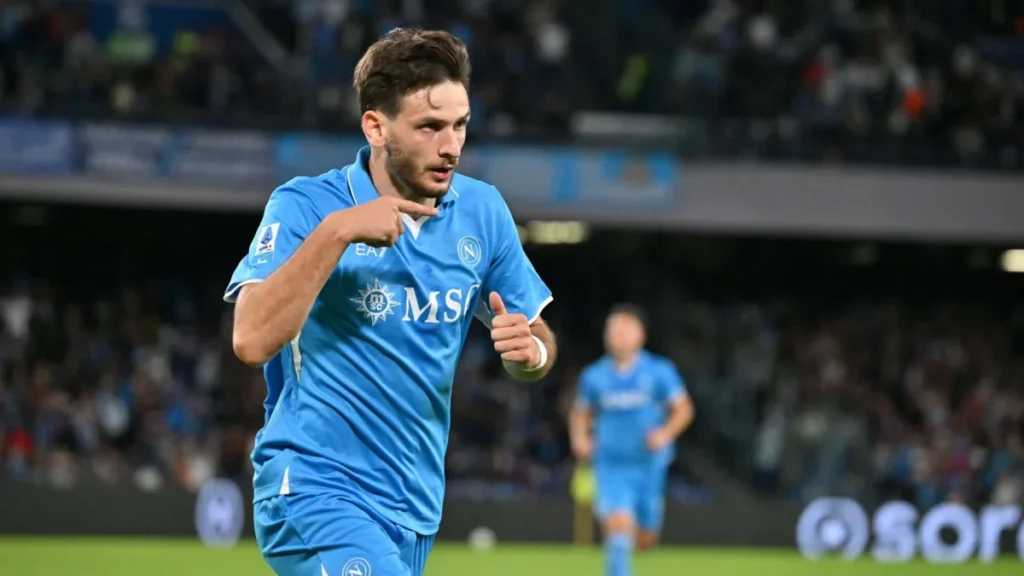
Community engagement activities have included hospital visits, charity match participation, and support for various social causes that address pressing needs in Georgian society. His willingness to use his platform and visibility for positive social impact demonstrates maturity and social consciousness. These activities also strengthen his connection to Georgian communities and reinforce his role as a positive public figure.
International charitable involvement has expanded as his profile has grown, allowing him to support humanitarian causes and disaster relief efforts beyond Georgia’s borders. His participation in international charity initiatives reflects growing awareness of global issues and desire to contribute to positive change on a broader scale. These activities also enhance his reputation as a socially responsible athlete who understands the privileges and responsibilities that accompany success.
What close people and colleagues say about the footballer
Family members consistently describe Kvaratskhelia as someone who has remained grounded and connected to his roots despite achieving international success and recognition. Their observations emphasize his continued respect for family values and traditions, even as his lifestyle and opportunities have changed dramatically. These family testimonials provide insight into his character development and the importance of maintaining personal relationships despite professional demands.
Coaching testimonials from various stages of his career emphasize his coachability, work ethic, and positive influence on team environments. Former and current coaches describe him as a player who makes their job easier through his professional approach and willingness to implement tactical instructions. These professional endorsements highlight qualities that extend beyond technical ability to include leadership and team contribution characteristics.
Teammate perspectives consistently mention his supportive nature and willingness to help others improve their performance, even when they might be competing for similar positions. His reputation as a positive teammate who celebrates others’ success while maintaining personal ambition has earned respect throughout his career. These peer evaluations provide valuable insight into his character and interpersonal skills in competitive environments.
Media representatives who have interviewed and covered his career describe him as articulate, thoughtful, and genuine in his interactions, qualities that have contributed to positive public relations and media coverage. His ability to handle media responsibilities professionally while maintaining authenticity has enhanced his reputation beyond football performance. These media relationships have also contributed to positive representation of Georgian football on international platforms.
